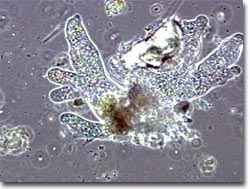

Briefly, it is not sensory adaptation since repetitive stimulation of the sensory surface does not produce a decrement in the amplitude of the recorded receptor potential...Likewise, it is not motor fatigue, since the threshold for contracting to electrical stimuli is not altered by habituation by mechanical stimuli... (personal email, 18 June 2003).
Wood also argues that habituation in protozoa is biochemically distinct from adaptation in bacteria, which was rejected earlier as a possible instance of habituation:
Based on the criterion of similar cellular and biochemical processing, it is clear that adaptation in bacteria, which involves only chemical processes and not ion channels is a rather different phenomenon than habituation in protozoa (personal email, 18 June 2003).
It has been argued in the Introduction that mental states should be distinguished using behavioural rather than chemical criteria; nevertheless, arguments based on biochemistry add weight to behavioural arguments suggesting that we are dealing with a new kind of phenomenon here, which is not found in prokaryotes.
Back to Protoctista References *** SUMMARY of Conclusions reached